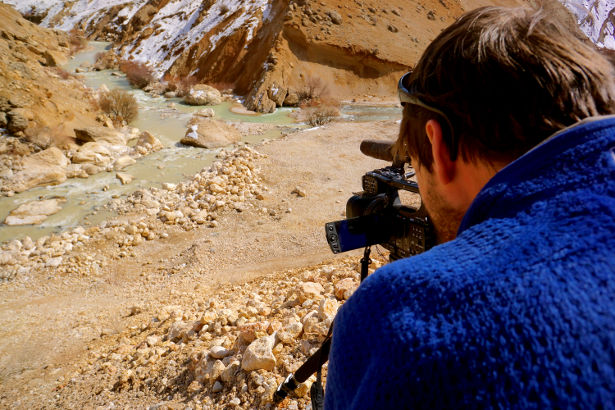This article is part of a series in which experts in their field share their top ten tips. Today’s advice comes from Leon McCarron who’s excellent documentaries have featured on National Geographic and been reviewed on this website. You can see the rest of the 10 Tips series here.

[divide]
10 Tips for Filming Your First Expedition
by Leon McCarron
1. Find your story
This might not be the same story as your trip, but it’s the key thing to always bear in mind when making a film. What is going to happen in your film? To whom? What is the beginning, middle and end of your story? This is where the majority of your creative energies should be spent.
2. Develop your characters
Even if your film is about you, you are still a character. Everyone who appears in your film is. Look at each character individually and how they interact with each other. What is their arc? Do they have their own story? Make sure all characters have a beginning, middle and end point (just as with your story) and that anyone unnecessary is cut out.
3. Learn your craft
Keep the camera steady, don’t zoom during the shot, know the different between a wide shot and a medium shot – learning some basic filming rules of thumb and understanding the grammar of filmmaking will take you a long way. You’ll learn on the go, but why do some reading about it at the same time?
4. Get coverage
Shoot cutaways of all the interesting little details in the scene. If you can, film an event/meeting/dramatic situation from a couple of different angles to give options in the editing room. If a 10-minute sequence is filmed in one shot from one camera, it’s going to be very hard to make it watchable for an audience unless the content is ground-breakingly awesome. Don’t be lazy – move around.
5. Film the tough times
If you’re thinking, ‘everything about this trip is so bloody awful and I’m truly, truly miserable with my life and this stupid situation’ then chances are it’s a good point to get out the video camera. When you’re low, or when things around you are happening at hyperspeed, the inclination is to deal first with those emotions or situations. Work on changing that impulse – as a filmmaker you need to capture the action at the same time.
6. Enjoy the journey
Don’t spend your whole time looking at a tiny LCD screen. Enjoy the journey – chances are you’re on a dream trip of some kind and very lucky to be where you are. Make the most of it – find the compromise between capturing what you need and keeping a little experience in reserve just for you.
7. Include people
You might be awesome, and you might be incredibly interesting. Regardless, an audience probably doesn’t want to watch you pontificating for an hour on their computer screen even if you are the next Slavoj Zizek. Balance your footage according to what you’ve shot, but where possible try to include other people. We’re a sociable race, humans, and we like to see and learn from other people. Give folk you meet a moment in the limelight.
8. Invest in decent equipment
You can make a good film on an iphone. You can make a bad film on a £50,000 camera. Equipment is not essential BUT it does help to have decent stuff if you can afford it. Get an HD camera, a sturdy tripod, a quality microphone, plus some decent headphones.
9. Think about sound
If your sound recording is rubbish, your film will (probably) end up being rubbish. Don’t overlook this- as mentioned about, get a good microphone (a Rode NTG-1 or equivalent) or an audio recorder and learn how it works. Use a wind gag in wind, and look for sheltered locations to record key dialogue.
10. Be interesting
This is quite a tricky one, but do remember that an audience mostly wants to be entertained, educated or inspired. Think about who your are making your film for (your mum? your colleagues? Adventurers worldwide?) and keep the content interesting for those prospective viewers. When you’re filming, try to bear this in mind. Don’t film a paper bag for 4 hours just because nothing else has happened that day – wait until the next day and hope for something better.
[divide]
If you like this then check out the rest of the 10 Tips series or take a look at Leon’s website.
What do you think? Please do add your thoughts below…